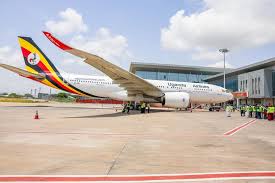Uganda Airlines has launched a new air cargo corridor connecting Nigeria to East and Southern Africa, aiming to facilitate Nigerian exports into the African Continental Free Trade Area (AfCFTA) market. The initiative was officially inaugurated by Dr. Jumoke Oduwole, Nigeria’s Minister of Industry, Trade, and Investment, on Monday, May 26, 2025, in Lagos.
This corridor, which operates from Lagos and Abuja, offers Nigerian businesses significantly reduced freight costs—currently 50% lower than standard commercial rates. The initiative is tailored for Nigerian micro, small, and medium-sized enterprises (MSMEs) that are members of recognized business associations, ensuring broad access across the business community.
Dr. Oduwole highlighted that the corridor is not merely a logistical advancement but a strategic move to enhance regional trade integration. She emphasized that the AfCFTA has transformed Africa into the world’s largest free trade area by the number of participating countries, presenting substantial opportunities for Nigerian businesses. The minister noted that intra-African trade now records higher levels of trade in value-added products than trade with other regions, underscoring the importance of this development for Nigeria’s economic diversification and industrialization goals.
The air cargo corridor is designed to address longstanding challenges faced by Nigerian exporters, such as high logistics costs and extended delivery times. By reducing delivery timelines from months to days, the corridor ensures that time-sensitive and perishable goods reach their destinations in optimal condition. This improvement is expected to stimulate job creation, encourage business growth, and contribute to broader economic development.
In addition to the cargo corridor, the Nigerian government, in collaboration with the United Nations Development Programme (UNDP), has launched an AfCFTA Market Insights/Intelligence Tool. This tool is designed to assist businesses in navigating regulatory requirements and identifying market trends in East and Southern African countries, thereby enhancing their competitiveness in the regional market.
Dr. Oduwole expressed gratitude to Uganda Airlines for their partnership in this initiative, describing the air corridor as a pathway for Nigerian MSMEs to expand across Africa with greater confidence, lower costs, shorter timeframes, and reduced risks. She also acknowledged the support of Nigeria’s leading business groups—NACCIMA, NASME, NASSI, WCCIMA—and the UNDP for their collaborative efforts in coordinating credible exporters for the air cargo corridor.
The establishment of this corridor marks a significant step towards enhancing trade relations between Nigeria and other African nations, aligning with the broader objectives of the AfCFTA to promote economic integration and sustainable development across the continent.
